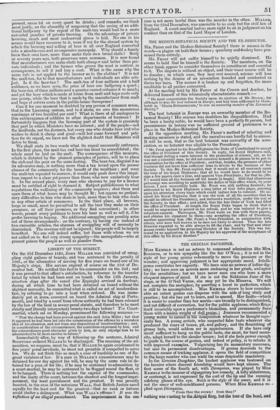LIBERTY OF THE SUBJECT.
ON the 22d December 1824, JOHN MILLER was convicted of smug- gling eight gallons of brandy, and was sentenced to the penalty of 1001., or the alternative of serving for five years on board one of his Majesty's ships. His service expired of course on the '21st of De- cember last. He notified this fact to his commander on the 23d; and it was proved to that officer's satisfaction, by reference to the transfer ticket by which he had been sent on board. On the 12th January, nineteen days after the vessel (the Espiegle) arrived in harbour, during all which time he had been detained on board without the slightest necessity, he committed what is called an act of insubordina- tion, by refusing to go into a boat when ordered. He was imme- diately put in irons, conveyed on board the Admiral ship at Ports- mouth, and tried by a court from whose authority he had been released by the law of the land (a severe penal statute, and therefore to be most strictly and literally interpreted) twenty-two days before ! The Court- martial, which sat on Monday, pronounced the following sentence :- "That the charge had been proved against the said John Miller; but that it appeared he had been led into the commission of the offence by a mistaken idea of his situation, and not from any disposition of insubordination ; and, in consideration of the circumstances, the contrition expressed by him, and the extraordinary good character given to him, do only adjudge him to be admonished to be more careful in future."
Immediately after, by way of following up the sentence, Admiral STOPFORD ordered MILLER to be discharged. The meaning of the ad- monition, we suppose, must be, that if MILLER be again condemned to five years' penal servitude, he must not grumble if compelled to serve ten. We do not think this so much a case of hardship as one of fla- grant violation of law. If a man in MILLER'S circumstances may be detained for one day against his will, he may by the same rule be de- tained for a year, or for life ; if he may be sentenced to admonition by a court-martial, he may be sentenced to be flogged round the fleet, or to be hanged. There is nothing but the caprice of the commander, and the lenity of the court, between the shortest and the longest impri- sonment, the least punishment and the greatest. It was proudly boasted, in the case of the notorious WALL, that British Justice cared equally for the least and for the greatest—that no rank or fortune could shelter a delinquent. What was WALL'S offence ? It was the siglietton of an illegal punishment. The imprisonment in the one case is not more lawful than was the murder in the other. MILLER, from the 22nd December, was amenable to no code but the civil law of England. A court-martial had no more right to sit in judgment on his conduct than on that of the Lord Mayor of London.


















 Previous page
Previous page